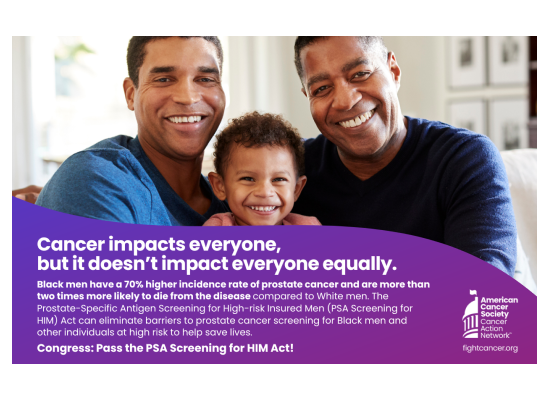This post is sponsored by the American Cancer Society
Prostate cancer is the most common cancer in American men after skin cancer. The American Cancer Society (ACS) estimates about 288,300 new cases of prostate cancer and about 34,700 deaths from prostate cancer this year alone.
These numbers show how vital it is to raise awareness and provide equitable access to care. This is especially important for individuals at high risk for prostate cancer and to help reduce the cancer burden on communities disproportionately impacted by prostate cancer.
 Lisa A. Lacasse, MBA is president of the American Cancer Society Cancer Action Network (ACS CAN), the nonprofit, nonpartisan advocacy affiliate of the American Cancer Society (ACS). She leads ACS CAN’s nationwide public policy advocacy agenda and oversees a team that empowers volunteers across the country to influence evidence-based policy change. She shared with us some insight into why advocacy is so important to improve cancer outcomes, especially for individuals at high risk.
Lisa A. Lacasse, MBA is president of the American Cancer Society Cancer Action Network (ACS CAN), the nonprofit, nonpartisan advocacy affiliate of the American Cancer Society (ACS). She leads ACS CAN’s nationwide public policy advocacy agenda and oversees a team that empowers volunteers across the country to influence evidence-based policy change. She shared with us some insight into why advocacy is so important to improve cancer outcomes, especially for individuals at high risk.
Question: Please share more about ACS CAN and elaborate on the work ACS CAN is doing to get the Prostate-Specific Antigen Screening for High-Risk Insured Men Act to become law.
Answer: We are proud to be the leading cancer advocacy organization in the country, advocating for evidence-based public policies to reduce the cancer burden for everyone. Our goal is making cancer a top priority for lawmakers at the federal, state, and local levels. We keep health equity at the center of our work to make sure all people impacted by cancer are represented as we elevate patient voices.
We know that cancer mortality has dropped 33% since 1991, averting an estimated 3.8 million cancer deaths largely due to prevention, screening, early detection, and improved treatments. However, the sad reality is that prostate cancer rates have been increasing since 2014, disproportionately impacting certain groups, especially the Black community. Our goal is to give high-risk individuals a fair chance to detect, treat and survive this disease through regular screening.
The Prostate-Specific Antigen Screening for High-risk Insured Men (PSA Screening for HIM) Act can eliminate barriers to prostate cancer screening. ACS CAN is urging Congress to pass the PSA Screening for HIM Act (H.R. 1826). All men at high-risk for prostate cancer who decide to move forward with screening after a discussion with their health care provider should have barrier-free access without cost sharing. We are partnering with lawmakers to secure more support for this legislation and have made PSA Screening for HIM one of our top priorities.
Q: Can you elaborate on ACS CAN’s commitment to address disparities for Black men, especially addressing the social and economic root causes that place Black men at higher risks for prostate cancer?
A: At ACS CAN we often say, “cancer impacts everyone, but it doesn’t impact everyone equally.” We know this to be true when it comes to prostate cancer. According to ACS data, the numbers show how vital it is to provide equitable access to care for individuals at high risk for prostate cancer and to help reduce the cancer burden on communities disproportionately impacted.
Black men have a 70% higher incidence rate of prostate cancer and are more than two times more likely to die from the disease compared to White men. Also, having a brother or father with prostate cancer more than doubles the risk of developing the disease. But historically Black people have lower cancer screening rates due to barriers to care. Evidence consistently shows that certain factors – like race/ethnicity, health insurance status, income and where a person lives – impact access to care.
One of the largest obstacles to high-quality care is cost, and reducing disparities in access to cancer care begins with addressing this burden and its disproportionate impact on the Black community. We know that Black people with cancer and survivors have high health care costs and experience considerable financial hardship. We believe no one should have to weigh their expenses as a determining factor on whether they have a chance to survive cancer.
Q: What is the ACS IMPACT initiative and how is ACS CAN working through this initiative to improve mortality rates from prostate cancer?
A: We have an opportunity to improve outcomes for all men with prostate cancer, and especially for Black men. This year, ACS launched IMPACT, an initiative geared toward Improving Mortality from Prostate Cancer Together. With IMPACT, ACS is committed to improve outcomes for all and reverse disparities for Black men. ACS Discovery efforts will lead innovative research focused on accelerating cures and working to identify the root causes that place Black men at higher risks for prostate cancer. ACS Patient Support work will use a whole- person approach from prevention through survivorship to reduce prostate cancer mortality with a focus on patients, caregivers, and clinicians. And at ACS CAN, we will continue to champion public policy advancement nationwide focused on reducing prostate cancer disparities by elevating the patient voice for change.
Q: What other steps is ACS CAN taking to ensure that those at high risk for prostate cancer have access to the screening tests they need?
A: Beyond our federal advocacy, ACS CAN is also working to improve access to prostate cancer screenings at the state level by advocating for state laws that require health insurance plans to cover prostate cancer screening for high-risk individuals with no cost sharing. We are working to tackle this issue at every level of government.
Q: Why is it important for companies to get involved to support these efforts and how can it make an impact for their business, employees, and community?
A: ACS CAN engages partners in the business community on a regular and substantive basis by fostering mutually beneficial relationships, building bridges, as well as ACS CAN’s ability to fulfill its lifesaving mission. As ACS CAN continues to grow, so too does its capacity to leverage its grassroots strength and policy expertise to improve the health and well-being of cancer patients and their families.
Now is the time to focus on combating prostate cancer through legislative change to promote equitable access to care and improve cancer outcomes. ACS is improving the lives of people with cancer and their families each day as the only organization combating cancer through advocacy, research, and patient support.
Be part of a meaningful collaboration that can help save lives. Together, we can end cancer as we know it, for everyone.
Learn more about how to become an ACS partner.
